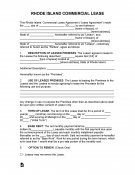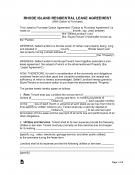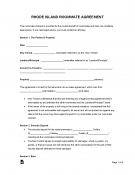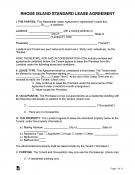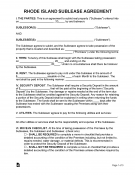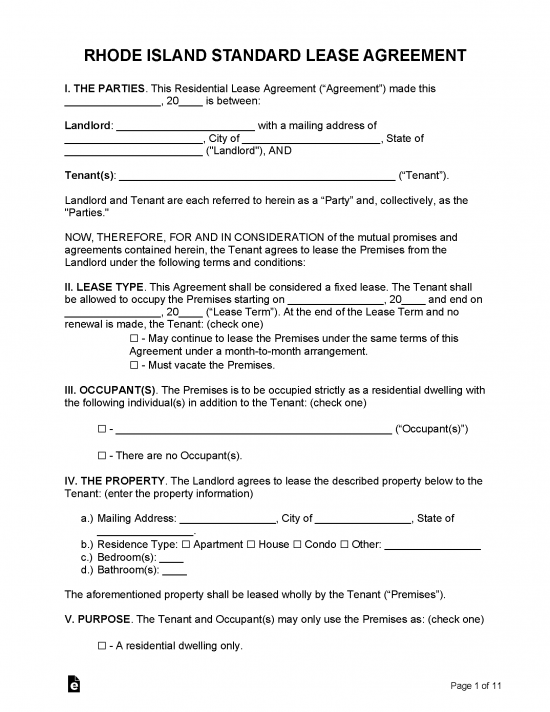Rhode Island lease agreements are contracts that set the terms of a tenancy. The agreements are in writing, signed by both the landlord and the tenant, and will contain essential terms like rent and the party responsible for particular utilities. Lease agreements can be valuable tools to help landlords and tenants avoid disputes by providing common ground for understanding their obligations under the lease.
Contents
By Type (6)
- Commercial Lease Agreement
- Month-to-Month Lease Agreement
- Rent-to-Own Lease Agreement
- Roommate Lease Agreement
- Standard Lease Agreement
- Sublease Agreement
Download: Adobe PDF, MS Word, Rich Text Format
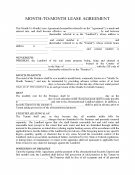 Month-to-Month Lease Agreement
Month-to-Month Lease Agreement
Download: Adobe PDF, MS Word, Rich Text Format
Download: Adobe PDF, MS Word, Rich Text Format
Download: Adobe PDF, MS Word, Rich Text Format
Download: Adobe PDF, MS Word, Rich Text Format
Download: Adobe PDF, MS Word, Rich Text Format
Landlord-Tenant Laws
Statutes – Title 34, Chapter 18 (Residential Landlord and Tenant Act)
Required Disclosures (3)
Code Violations – Before signing a lease agreement, a landlord must disclose to the tenant any outstanding code violations associated with the property. (§ 34-18-22.1)
Landlord/Manager Disclosure – Landlords must disclose the names and contact information for both the property manager and the person authorized to receive notices and complaints on the landlord’s behalf. (§ 34-18-20)
Lead-Based Paint Disclosure – For leases of properties with dwelling units built before 1978, federal law requires that landlords provide information to tenants about the dangers of lead-based paints.
Security Deposit Laws
Maximum Amount ($)
Landlords cannot require a security deposit greater than one (1) month’s rent. (§ 34-18-19)
Returning to Tenant
Following the termination of a tenancy, landlords must return a tenant’s security deposit within twenty (20) days. Landlords may retain all or a portion of the deposit only in order to pay for owed rent, reasonable cleaning expenses, unpaid trash disposal fees, and the cost of fixing damages to the property, other than those caused by normal wear and tear.
If the landlord chooses to retain any of the security deposit, the landlord must provide a written explanation of any deductions along with the return of the remaining funds. (§ 34-18-19)
When is Rent Due? (grace period)
Rent is due on the date named in the lease agreement. There is no statutory requirement of a grace period.
Eviction Notice (non-payment)
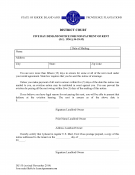 5-Day Notice to Pay or Quit – If rent is not paid in full by the 15th day after the date in the lease agreement, then the landlord may deliver this notice to the tenant, stating that, if the owed rent is not paid in full within five (5) days of the date the notice is provided, then the landlord may terminate the tenancy. (§ 34-18-35).
5-Day Notice to Pay or Quit – If rent is not paid in full by the 15th day after the date in the lease agreement, then the landlord may deliver this notice to the tenant, stating that, if the owed rent is not paid in full within five (5) days of the date the notice is provided, then the landlord may terminate the tenancy. (§ 34-18-35).
Download: Adobe PDF
Maximum Fees ($)
Late Rent Penalties
Landlords in Rhode Island are permitted to charge late fees; the law is silent on how much. In order to ensure that the late fee is enforceable, the fee should be reasonable and clearly stated in the lease agreement.
NSF Checks
Rhode Island law does not specify what fees may be imposed on tenants who offer bounced rent checks. As with late rent fees, best practice is to identify the fee in the lease agreement and for the fee to be reasonable, such as the amount the landlord’s bank charges the landlord in return for offering a check with insufficient funds.
Tenant’s Unclaimed Property
If the property is left behind after the end of a lease agreement The Rhode Island Office of Housing and Community Development recommends putting them in storage for a reasonable amount of time and to make them available to the tenant without restrictions.
The landlord should also make a good faith effort to contact the tenant to alert him or her to the personal property left behind. If personal property is left behind following a court-ordered proceeding, such as an eviction, law enforcement will remove the property and put it in storage, but tenants will be required to pay storage costs before getting the property back.
